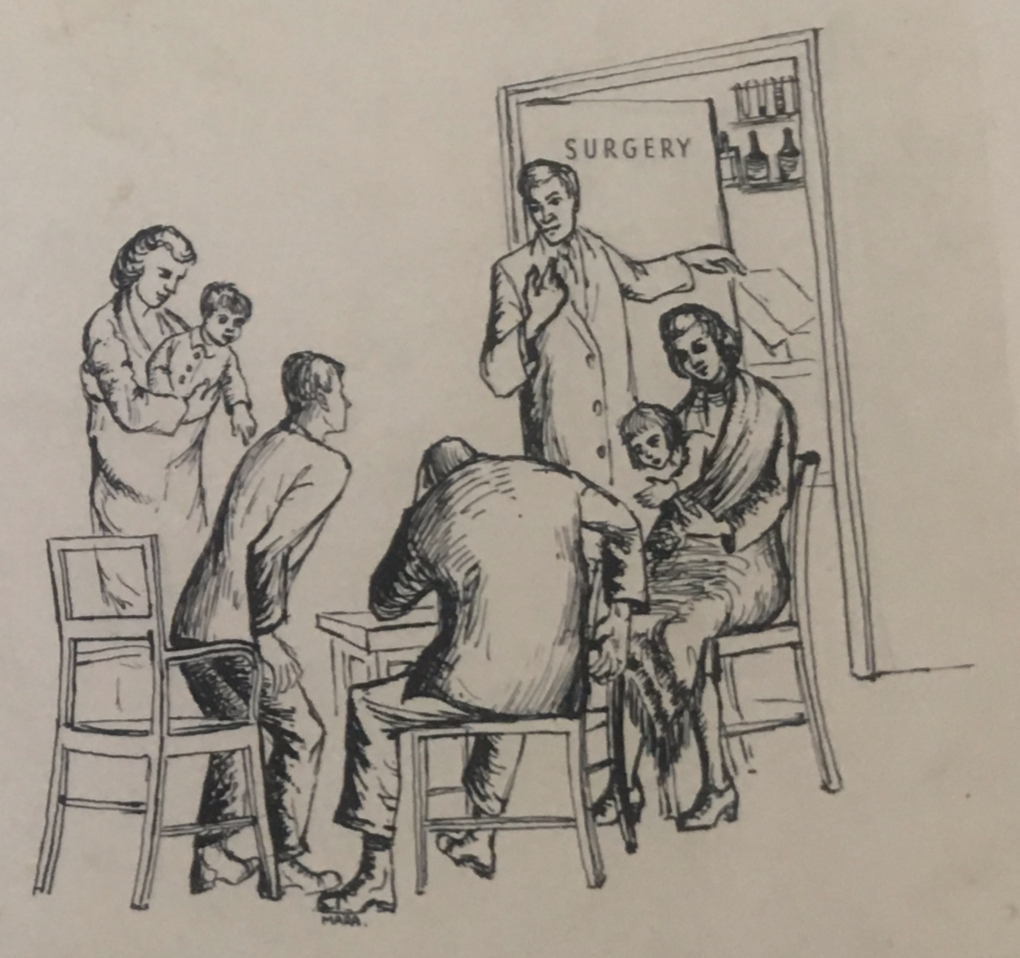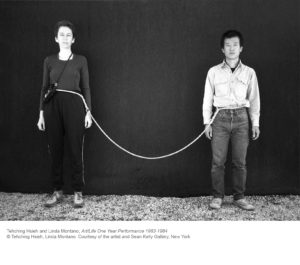Hurry Up and Wait explores how understandings and experiences of time, waiting and care were reformulated in post-war British general practice, as a distinctly NHS form of “modern” primary care was forged through general practice’s incorporation into the early welfare state.
Historiographically, the most remarked upon temporal development in twentieth-century systems of mass healthcare has been the emptying and economising of time as part of growing emphases on efficiency. Such developments formed part of broader political and cultural concerns with productivity, imperial fitness and lost time. These anxieties intensified in Britain over the early post-war decades, as the state confronted substantial wartime debts and shifts in imperial and global economies, whilst also becoming increasingly responsible for the welfare of (and social risks faced by) its citizens.
NHS general practice was by no means disconnected from these broader trends. GPs, civil servants, politicians, health service researchers and growing “primary care” teams increasingly divided time into standard abstract units, synchronised it to the needs of medical labour, and cast it as an economic resource to be efficiently spent or invested in individual and collective health. Within such a framing, waiting and other forms of impeded time were understood as not only potentially damaging to individual and collective wellbeing, but also wasteful, morally wrong and politically problematic.
However, as substantial as this temporal transformation in general practice was, it provides only one historical vista on time and waiting within modern British health services. In attending to histories of five key temporal technologies, sites and practices of primary care – the appointments system, the waiting room, the consultation, the home visit, and anticipatory care – Hurry Up and Wait draws attention to the historical plurality of temporal reformulations occurring in post-war general practice. It draws attention to complex ways that particular forms of recursive, suspended, chronic, developmental, biographical and historical time became connected with competing ideas of care in “the everyday”. Moreover, in situating general practice in relation to broader cultural and political ideals of welfare, it articulates how post-war welfare’s messiness, contradictions, and inequalities (around class, race, gender, professional power and sexuality) manifested temporally – from shifting rights to be seen and transformations in the spaces and uses of waiting, to new practices of consultation and uneven distributions of care time and attention.
In doing so, Hurry Up and Wait provides a social and cultural history of time and care within the ‘short life of British social democracy’, and contributes to a growing literature complicating the equation of modernity with clock-time. Finally, it uses historical enquiries into discursive, material and experiential aspects of waiting to stress the social and temporal situatedness of a common everyday occurrence. It thus extends recent philosophical, sociological, critical theoretical and psychological investigations of the subject, by highlighting how perceptions, expectations and structures of time and waiting are both contextually informed by, and inherited from, the past.
*
Outputs
Publications
‘Historicising “containment and delay”: COVID-19, the NHS and high-risk patients’, Wellcome Open Research (2020): https://doi.org/10.12688/wellcomeopenres.15962.1.
with Stephen Hinchliffe and Lenore Manderson, ‘Planetary healthy publics after COVID-19’, Lancet Planetary Health, 5:4 (2021), e230-6: https://doi.org/10.1016/S2542-5196(21)00050-4.
‘Waiting for the doctor: managing time and emotion in the British National Health Service’, Twentieth Century British History, Advance Access (2021): https://doi.org/10.1093/tcbh/hwab040.
‘‘Bright-while-you-wait?’ Waiting rooms and the National Health Service, c. 1948-58’, in Jennifer Crane and Jane Hand (eds.), Posters, Protests and Prescriptions: Cultural Histories of the National Health Service in Britain, (Manchester University Press, Forthcoming: May 2022): https://manchesteruniversitypress.co.uk/9781526163462/.
In Progress
with Gareth Millward, ‘Abuse or a cry for help? Trivia, certification, and “wasting” time in the British National Health Service’, (Article in preparation.)
Hurry Up and Wait: Time, Waiting and Care in Post-War British General Practice, (Monograph in Preparation).
Selected Book Reviews
‘Fit to Practice: Empire, Race, Gender and the Making of British Medicine, 1850-1950, by Douglas M. Haynes’, Journal of British Studies, 58:2 (2019).
‘Migrant Architects of the NHS: South Asian Doctors and the Reinvention of British General Practice (1940s-1980s), by Julian M. Simpson’, Contemporary British History, 34:1 (2020).
Websites and Blog Posts
‘Risk’, The Index of Evidence (Forthcoming, February 2022).
For my writing on the website, see pieces on:
‘Patiently waiting in the early NHS?’ (May 2018).
‘Reflecting on the archives of waiting rooms’ (May 2019).
‘Notes from the European Association for the History of Medicine and Health Biennial Conference’, (September 2019).
‘Accessing the doctor and the time of care in British general practice’, (January 2020):
‘Time and the consultation in British general practice’, (March 2021).
‘COVID-19 and Making History’, (April 2021).
Conference and Seminar Papers
‘What did it mean to wait in the early NHS?’, Social Life of Time Conference: Power, Discrimination and Transformation, University of Edinburgh, 5th-7th June 2018.
Panel Participant, “Waiting Times”, Why Care?, Institute for Cultural Enquiry, Berlin, 5th-6th July 2018.
‘What did it mean to wait in the early NHS? Discourses of waiting in the British National Health Service, c. 1940s-1960s’, Society for the Social History of Medicine Conference, University of Liverpool, 11th-13th July 2018.
‘“Well, we had our first child on the NHS…”: Waiting and the everyday in the early National Health Service’, Cultural Histories of National Health Care Conference, University of Warwick, 18th-19th September 2018.
‘Sugar and Spikes: Changing Approaches to Diabetes Care’, Royal College of Physicians of Edinburgh Evening Seminar, 11thApril 2019.
Panel Participant, “Waiting Times: Psychosocial Thoughts on Time and Care”, Association for Psychosocial Studies Conference, Birkbeck, University of London, 16th-17th May 2019.
‘“Bright-while-you-wait”: GPs’ waiting rooms, health citizenship, and interstitial time in Britain’s queuetopia, c.1948-56’, Modern British Studies Conference, University of Birmingham, 3rd-5th July 2019.
‘‘Curtained and carpeted to give a homelike appearance’: materiality and sociality of GPs’ waiting rooms in Britain’s Queuetopia, c.1948-66’, European Association for the History of Medicine and Health Biennial Conference, University of Birmingham, 27th-30th 2019.
‘Watchful waiting’, University of Strathclyde Centre for the History of Health & Healthcare Seminar Series, December 2020.
‘Waiting for everyday healthcare in post-war Britain: gender, class and family in the GP waiting room, 1948-75’, Gender, Subjectivity and Health in the Post-1945 World Seminar Series, University of Essex, 15th February 2021.
‘It is not a “charity”. You are all paying for it, mainly as tax-payers’: Discourses of “freeness” and care in the National Health Service, 1948-79′, Psychoanalysis for the People: Free Clinics and the Social Mission of Psychoanalysis In Our Times, Freud Museum, 25th July, 2021.
Forthcoming
‘A means to ‘cope’ or a ‘barrier’ between doctor and patient? Appointments systems, time and fragility in post-war British general practice, 1948-1979’, Society for the Social History of Medicine Conference, 29th June-2nd July 2022.
Public Engagement
“What The Papers Said: The NHS at 70 – Promises and Discontents”, Public Workshop run with the Centre for Medical History, Exeter Cathedral, September 2018.
70th Birthday Party for the NHS, Interactive Public Event run with Exeter Library and University of Warwick, Exeter Library, June 2018.



